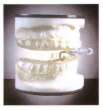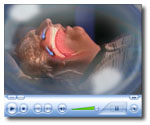- Chronic Sleepiness
- Strokes
- Heart Attack
- Heartburn

- Morning Headaches
- Depression

- High Blood Pressure
- Impotence

Park
Cities Dental
"The
Art and Science of a Healthy Smile"![]()
Sleep Apnea
The TAP has a unique design. It allows the patient to adjust the degree to which the mandible is held forward, simultaneously allowing maximum comfort and effectiveness. It is a custom-made two-piece appliance that snaps firmly over the upper and lower teeth. The hook on the upper tray and the bar on the lower tray of the appliance engage enabling the mandible to be pulled forward. The dial mechanism (Front Assembly), found on the front of the upper tray, controls the amount the mandible is advanced (titrated). When the patient finds a comfortable, effective position, the Front Assembly can be removed from the upper tray allowing the lips to close.
The TAP has alleviated snoring in more than 96% of patients who wear the appliance, making it more successful than any other oral appliance currently available. It is the only oral appliance proven effective for the treatment of severe obstructive sleep apnea.

Watch Apnea
Video!
TAP Appliance
Snoring Defined
When the jaw opens and the tongue falls into the back of the throat, the airway narrows forcing air through the small opening. This creates vibrations in the throat known as snoring. Although snoring seems physically harmless, it can be a "red flag" for a more more serious and sometimes fatal condition called obstructive sleep apnea.
Obstructive Sleep Apnea
Obstructive sleep apnea occurs when the airway completely collapses blocking airflow into the lungs. The harder one tries to breathe, the tighter the airway seals. This airway obstruction persists until the brain partially awakens the person. Unconsciously, he/she will close the jaw returning the tongue and throat to a normal position.
The sleep apnea cycle - falling asleep, jaw relaxing, airway collapsing, unconsciously awaking with a gasp, falling back asleep - can repeat itself 50 or more times per hour during the night. With a blocked passageway, one does not receive enough oxygen. Both the awakenings and oxygen deprivation can then trigger other health problems.
Sleep apnea can cause:
Sleep Apnea Related Links
Academy of Dental Sleep Medicine www.dentalsleepmed.org
Emedicine.com www.emedicine.com
National Sleep Foundation www.sleepfoundation.org
SleepNet.com www.sleepnet.com
Snoring and Sleep Apnea Solutions www.sleepdentist.ca
Return to Facts About Dentistry & Services
Send comments to: Dr. J. Eric Hibbs